|
Career Change Planning
Deciding to change careers is a big plan. Perhaps you have been in a wrong career path. This post is designed to help set you up for career shifting success.
The idea is to suggest you take action in as little as 10-15 minutes per day for the next few weeks. Take one action each day from one of the suggested actions — or you can come up with your own task to tackle! There are suggested actions in four categories:
Try to plan and track your activities. Here are three ways to do this:
Here are suggested actions within each of the areas: Future Orientation
Research
Mindset
Putting Yourself Out There

Image by Free-Photos from Pixabay;
Two Weeks Notice ExampleAugust 20 2021 Brittany Hillsong Green Acres Farm 22 Willshire Boulevard Beverly Hills, CA 90201 Dear Ms. Hillsong: Please accept this letter of resignation as my official notice that I will be leaving Green Acres effective September 3rd, 2021. Thank you for the opportunity to work with you, and please let me know if I can be of assistance in making this transition as smooth as possible. Sincerely, Michael O'Connor Two Weeks Notice Templaterelated to the Two Weeks Notice Example above ► ► Want to see a DIFFERENT Two Weeks Notice Example? ◄◄ IMPORTANT: A "two weeks notice" is also known as a "resignation letter" Example Letter of Resignation

Image by Robert Armstrong from Pixabay;
Two Weeks Notice Template
[Date]
[Contact Name] [Title] [Company Name] [Address] [City, State Zip] Dear [Contact Name]: Please accept this letter of resignation as my official notice that I will be leaving [Company Name] effective [last date with the company]. Thank you for the opportunity to work with you, and please let me know if I can be of assistance in making this transition as smooth as possible. Sincerely, [Your Name] Two Weeks Notice Example
related to the Two Weeks Notice Template above
►► Want to see a different Two Weeks Notice Template? ◄◄
IMPORTANT: A "two weeks notice letter" is also known as a "resignation letter"
Template for Resignation Letter
Example Resignation Letter
Below is an Example Resignation Letter based on a template for resignation letter offered in this blog's previous post.
August 21, 2021
Mr. John Olson Owner Olson Industries 1111 Main Street Los Angeles, CA 90011 Dear Mr. Olson: I have enjoyed working for your company for the past six years. During this time, I’ve enjoyed the opportunity to help grow the sales and position the company as the leading manufacturer of beauty supplies. I’ve also had the pleasure of working with truly inspiring associates and leaders. However, I have accepted a new position with another company. This letter is to confirm that my last day with Olson Industries will be on September 4th. I am happy to help with the transition process, training my replacement to provide a seamless transition. Thank you again. Sincerely, Mark Jobseeker Template for Resignation Letter
related to the Example Resignation Letter above
►► Want to see a different Example Resignation Letter? ◄◄
IMPORTANT: A "resignation letter" is also known as a "two weeks notice letter"
Two Weeks Notice Example
Template for Resignation Letter
When it’s time to leave, one must first reflect upon how to quit my job professionally. The first step is to let your supervisor or boss know verbally, but then follow up with an official letter of resignation (or provide the letter in the meeting with your boss). The letter of resignation serves as official notice that you are leaving the company and provides confirmation of key details, such as your last day with the company and any “housekeeping” items you need to confirm (return of company property, continuation of health insurance benefits, etc.).
Do not include any negative information in your resignation letter. Don’t disparage your supervisor(s), co-workers, the company, or its products or services. Your letter of resignation will be kept on file and what you say may influence any future reference checks. Whenever possible, hand-deliver your letter of resignation. Below is a template for resignation letter.
[Date]
[Contact Name] [Title] [Company Name] [Address] [City, State Zip] Dear [Contact Name]: I have enjoyed working at [Company Name] for the past [length of time]. During this time, I’ve enjoyed the opportunity to [name some key accomplishments]. I’ve also had the pleasure of working with some wonderful people. However, I have accepted a new position with another company. This letter is to confirm that my last day with [Company Name] will be on [date]. I am happy to help with the transition process, training my replacement to provide a seamless transition. Thank you again. Sincerely, [Your Name] Example Resignation Letter
►► Want to see a different Template For Resignation Letter? ◄◄
IMPORTANT: A "resignation letter" is also known as a "two weeks notice letter".
Two Weeks Notice Template
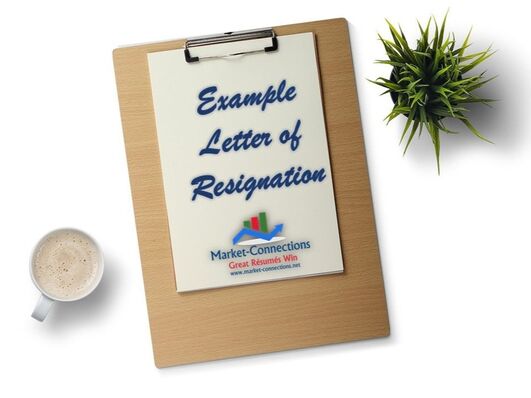
Image by Robert Armstrong from Pixabay;
Writing Your Resignation Letter
Is a letter of resignation necessary? It depends. Many jobseekers simply tell their boss verbally that they are leaving — but there are several advantages to actually writing a resignation letter.
Structure of a Letter of Resignation
Letters of resignation should be positive in tone. This is not the time to air your grievances. Your resignation letter will likely become a part of your permanent file, so choose your words carefully. If at all possible, hand-deliver (don’t email) your letter of resignation.
In the future, the person verifying your employment with the company might not be someone you worked with previously. They may review your file and what you write in your letter of resignation might be important. A strong recommendation can be important — and it’s appropriate to reiterate your contributions in the resignation letter so that information is in your file. Just don’t go overboard; this is about you leaving the company, not negotiating a raise or a promotion. In your letter, be sure to thank your employer for the opportunities you had. You can also reiterate valued personal relationships in your resignation letter — acknowledging your work with your coworkers and supervisors. What to include in your letter of resignation:
Sample Resignation Letter
Here is an example letter of resignation:
Dear (Supervisor Name): This letter is to inform you that I am resigning from my position as (job title) with (company name), effective (date). I am willing to stay on for two weeks — until (date) — in order to provide a seamless transition for my replacement. I have appreciated the opportunity to learn from you and contribute to the company in this role. Being able to be a part of the team that launched the (name of project) that sparked the division to its highest revenues ever is something that I will always remember. One of the most difficult things about moving on is the loss of your guidance. I have greatly benefited from your leadership and mentoring, and I would welcome the opportunity to keep in contact in the future, as I sincerely value your knowledge and experience. We will need to work out my final work schedule as well as disposition of my accrued vacation/leave time and employee benefits; I will await your guidance on how to handle these matters. Personal correspondence can be sent to me at my home address (list address), or via email at (personal e-mail address). I wish you — and the company — all the best. Sincerely, (Your Name) (Your contact information)
►► Would you like to see a Template For Resignation Letter? ◄◄
How about another Example Resignation Letter?
►► One more Template PLUS one more Example ◄◄
IMPORTANT: A "resignation letter" is also known as a "two weeks notice"
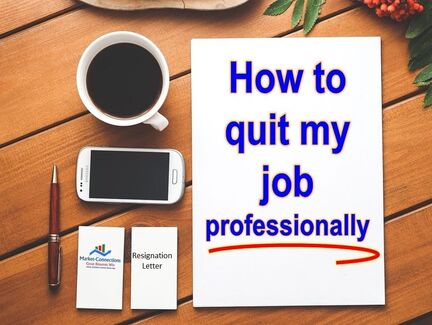
Image by Karolina Grabowska from Pixabay;
Resign Without Burning Bridges
The news about the great resignation is out. You have spent weeks or maybe even months looking for a new career or job. You evaluated a new job offer and accepted it. Now, you must quit your current job. Do you know how to quit your job? Before jumping headfirst into the process, stop and remember a few basics that will ensure you don’t leave with a cloud over your head.
Don't Tell Everyone Else First
Office gossip at the water cooler is a regular occurrence, and not how you want your supervisor to find out that you are leaving.
Don’t tell your coworkers you’re leaving before you inform your boss. Even if you have a friend or confidant in the office, don’t let him or her know you are interviewing for another position, or that you’ve landed a new role. You must ell your boss first. Be sure to go directly to him or her before telling anyone, even your office bestie. In best-case circumstances this should be done in person, but over the phone or through a video conferencing platform if time and distance require it. An email should be your last resort when resigning from a position, but is acceptable when extenuating circumstances arise. Plan Your Exit Speech
Your exit speech does not need to be Oscar-worthy, but it should cover all the pertinent information. Also, being prepared to quit your job can help lessen the awkwardness and will give you the ability to steer the conversation.
Respecting Your Colleagues
Don’t neglect your colleagues. Although the formal resignation letter is for your immediate supervisor, consider writing separate notes to co-workers to let them know you appreciated working with them. Take steps to keep your connections with your current (soon-to-be former) colleagues. Collect personal contact information for valued contacts and assure them their professional calls and inquiries will be welcome in the future.
Counteroffers
Be prepared for your supervisor to ask questions. He or She might even make a job offer counter offer.
You may want to research the data on what happens when an employee accepts a counteroffer. Generally-speaking it may not be a good idea to accept a counteroffer, not matter how tempting. Keep in mind, employees who accept another job offer — even if they ultimately end up staying in their current position — may be perceived as “disloyal.” If you get a counteroffer, know your answers ahead of time. Be sure to research the data on counteroffers. This way, you will both leave the meeting feeling better about your decision. Leave a good impression behind – Ask for references
Make a good impression all the way to the end. Remember, “Often, the last thing people remember about you is your last days on the job, not your first.” What should you be doing in your last few days and weeks on the job? Whatever your boss wants you to. Have a conversation with your supervisor. What does he or she want you to work on? Will you be training your replacement? Are there any major projects to complete? Can you document processes and procedures in enough detail that someone else could complete the tasks?
Ask your supervisor for a reference — either a letter or a LinkedIn Recommendation. You can also ask what information will be provided in the future when someone contacts the company for information to verify your employment, or for a reference. Some companies have a policy that they only provide dates of employment, and that all reference checks must go through the Human Resources department — so your supervisor may not be able to provide a reference.
Now that you have a plan in place to make your exit follow through with it and finish your time at your current job strong. Use that time to wrap up loose ends and hand-off items and contact information to those that will need them, so that you leave on a good note. You may want to come back or find yourself working for or with that company in the future.

Image by Gerd Altmann from Pixabay;
The Great Resignation
One thing has led to another and we have entered the era of “The Great Resignation”. How did we get here?
There are many layers of problems that have built up to the great resignation. Perhaps it was a lack of engagement, no sense of purpose, or a desire to belong… Maybe you didn’t find anything optimistic about the company’s future, didn’t feel a sense of productivity, couldn’t give meaning to the company’s mission and vision, or weren’t able to create a sense of connection. Our work issues have now resulted in a collective unwillingness to return to work and you want to leave your current position. No matter the reason you’re departing, it’s best to head out the door on good terms. This is important for you as well as for those you are leaving behind, especially for the person who will fill your role. Learning how to prepare to quit your job is an important process. Follow the tips below to make your transition smoother and leave on a positive note, so you don’t burn your bridges. How To Professionally Quit A Job
To begin with, and before you write off your current place of employment, see if there are any opportunities for moving on up within the company. Sometimes a department switch could be all that you need. Check with your Human Resources office first.
Check Your Employment Contract Make sure you are not under contract to finish out a certain amount of time. Breaching a contract could result in serious complications to transitioning jobs. The most drastic being loss of wages. Think About What You Want to Say Before making any announcements, think about what you want to say to your supervisor. Remember that this is not a time to air your grievances, but instead the beginning of your transition into a new career. Write Your Letter of Resignation Your letter of resignation should inform your supervisor that you are leaving your position and clearly state your last working date. You should also thank your supervisor for your time with the company. Talk to Your Supervisor It's important to know how to quit a job. The first person that you inform of your decision to leave should be your supervisor. Use this as a time to thank him or her and plan for your last weeks of work. You can use your letter of resignation as an outline to guide you through this conversation. Work Out Your Two Weeks Don’t coast your last two weeks at work. Wrap up open projects, submit important information, and inform clients or other coworkers that you will be leaving. Sort Out Any Issues with Your Benefits If you have any unused vacation, sick time, or other benefits, see your Human Resources department about using them up or paying them out. Also, if possible, start the process of switching to new insurances or retirement plans. Quitting your job is sure to be an exciting time and that is all the more reason to have a solid plan in place that you can follow. Think of it as crossing your t’s and dotting your I’s one last time. Make sure you quit your job professionally. Should I Quit My Job Quiz
Being unhappy at work is no fun. Constantly dreading your next eight-hour workday or coming home drained and exhausted is not a way to live. If this is the precipice you have found yourself, think it through before you leap.
Quitting your job is a major decision. Before making it, stop and reflect on the above questions so you can better judge what to do next. You really must lean to prepere to quit your job first. It should not be a hasty decision only to follow a trend.

Image by Angelo Rosa from Pixabay;
Pharmacy Technician Resume SamplePharmacy Technician Career
Becoming a Pharmacy Technician is a great career opportunity. As a student you will need to follow the same path that an individual looking to become a Pharmacist travels but only stopping short of completing your PharmD degree. A Pharmacy Technician serves both patients and the Pharmacist. A Pharmacy Technician has duties that are both challenging and rewarding too.
Median hourly earnings for pharmacy technicians vary by geographical location as well as by the level of individual experience. The job outlook for pharmacy technicians is phenomenal. Any pharmaceutically-based occupation will certainly be important now and also in the future. With people living longer and medicines becoming more sophisticated and numerous there is no way to go wrong with a career in medicine. Pharmacists and pharmacy technicians will always be in demand. Pharmacy technicians are more in demand due to the fact there can be as many as four technicians aiding one single pharmacist. Pharmacy technicians have several options for workplace settings. The overall duties will not vary greatly in the field of pharmacist technicians. The variations in workplace choices add just enough spice to the career opportunities to make becoming a Technician greatly appealing. Seven of the ten jobs occupied by pharmacist technicians are in retail pharmacy positions. Retail pharmacy encompasses both independently-owned or chain store pharmacy settings. Nearly two of ten pharmacy technician jobs are in hospitals. There are also smaller proportions that belong to the aspects of the pharmaceutical trade such as mail order, clinic, and wholesalers. It takes grand people skills to participate as a pharmacist technician. Successful technicians are alert, organized, dedicated and efficient in their work. A technician should have an eye for detail and not be easily distracted. An independent reliable nature encourages the supervising pharmacist to be confident you can handle all types of situations. Your work is directly related to life and death in more ways than one. As a technician you will have to interact daily with patients, pharmacists, and various healthcare professionals. Teamwork is an important part of the successful career of any pharmacy technician as you will be working closely with pharmacy aids and pharmacists too. Your duties will vary greatly from those of any other health care professional but will relate directly to the duties of a pharmacist. Your responsibilities are receiving prescriptions sent electronically for your patients where by, you as a technician have to verify the information is accurate and complete. Then the prescription must be prepared. These tasks take special attention to details. Prescriptions must be measured, counted, and weighed in some cases in order to for them to equal the dose requested by the physician for the patient involved. Technicians will label and price the prescriptions. Then the information has to be filed in an accurate and timely manner. There is no room for error in this type of career. AuthorMandy Fard is a Certified Professional Resume Writer (CPRW, CMRW) and Recruiter with decades of experience in assisting job seekers, working directly with employers in multiple industries, and writing proven-effective resumes. 
Image by Free-Photos from Pixabay
How To Customize Your Resume
Customizing your resume demonstrates your interest in a job and shows you have taken the time to tailor the resume. This guide will help you navigate the customization process.
What Does Customizing Your Resume Mean?
It’s the difference between seeing a car commercial on television and having one show up in your Facebook feed. One is geared towards a large audience of viewers — the other, presumably, is more targeted to meet your specific interests in a vehicle. In a similar way, a customized resume demonstrates the alignment between what the employer wants to see in the resume of their next hire, and the exact skills, experience, and education you have to offer.
Why Customize Your Resume For Each Position?
Estimates are that 70 percent of larger companies use applicant tracking system (ATS) software to screen resumes. If you’re not customizing your resume, you may be less likely to be selected for an interview. Even if the company doesn’t use ATS software, customized resumes are more appealing to human readers. One size doesn’t fit all.
How To Tailor Your Resume
The process of tailoring your resume starts with your professionally written document. It helps to have guidelines or at least a list of tips for resume writing. Most resumes can be customized to target similar roles within the same industry. For example, you could customize your teaching resume to target different grade levels, different types of schools (public, private, etc.), and different school districts. But that same teaching resume should not be used for a different industry or profession — for example, to pursue a position in sales.
Tailoring the resume (and cover letter) can help your documents successfully get through ATS software and into the hands of the recruiter or hiring manager. This process doesn’t require a full rewrite of the resume. Tweaking the documents will improve your chances of getting your resume seen. If the thought of customizing each resume stresses you out, don’t worry! You always have the choice to customize “a little,” “the middle” (more than a little, less than a lot!), or “a lot.” Another pro tip is to keep a second “master” document of your customizations. That way, you can copy-and-paste them into your customized document if they are applicable to a specific role. Prioritize quality over quantity. Instead of sending the same resume to apply for 50 jobs, take the time to research and customize your resume for 10-15 roles. You may be submitting fewer resumes, but you are increasing your chances of landing the interview … and the job. Customize “A Little” You should always customize the resume, even if it’s just a little. Never send a generic resume. You wouldn’t send the same greeting card for a birthday and for an anniversary, would you? So don’t send the same resume to two different companies. Minor customization will only take 5-10 minutes. The first step when customizing your resume is to do a “save as” of the document to preserve the original file. Re-name the file with your first name, last name, and desired job title (for example: JaneJobseekerSalesResume.doc). The easiest change to customize the resume for the position you want is to include the desired job title and company name at the top of the resume. This is a quick visual cue to show you customized the resume for this specific opportunity: (Job Title) at (Company Name) For example: Public Relations Specialist at ABC Company If the job title of the position you’re seeking is not the same as your current job title, put this at the top of the resume: Job Target: (Desired Job Title) For example, if you are currently a sales associate and you’re seeking a sales consultant role, your headline on the resume would read: Job Target: Sales Consultant You can also use this formula: Seeking (Desired Job Title) Role at (Name of Company) For example: Seeking Public Relations Specialist Role at ABC Company When customizing “a little,” be sure to customize the Summary section. For human readers, this is often the first section they read. You want to ensure the skills and experience most desired by the prospective employer are highlighted in the top one-third of the resume. Take a few minutes to make sure the job responsibilities and accomplishments listed in your resume match the needs of the employer, especially those outlined in the job posting. You can also re-order accomplishment bullets to prioritize achievements related to the job being targeted. Customize “A Middle” Amount When customizing more than just “a little” — but not a full customization, focus on the company’s needs and how you are a match for what they’re looking for. This type of customization may take as little as 10-15 minutes. When possible, have the job posting in front of you so you can tailor the resume to the job description. Companies hire employees to solve their problems. In her book, Resume Magic, author Susan Whitcomb identifies 12 specific needs (“Employer Buying Motivators”) a company has. These include the company’s desire to:
Identify the problems this job is designed to solve and help the prospective employer see how you can help them solve these specific problems. You can either print the job description and highlight it or feed it into a word cloud app. Examples of free word cloud software includes: A word cloud generator will highlight some of the most important keywords being used in the job posting (especially ones that are mentioned more than once). For example, here is a word cloud generated from a Public Relations Specialist job posting:
The word cloud highlights skills (marketing, planning, communications), key responsibilities (media relations, working with the public, planning and executing events, developing community, soliciting sponsorships, building relationships), and values (collaboration, balance, flexible).
Analyze the job posting (and/or word cloud):
Make sure you are using the keywords used in the job description. “Similar” isn’t good enough. Match the language used in the job posting to help your resume rank higher in the ATS. Mirror the exact words and phrases that are used in the job description.
Be sure to incorporate keywords in your Summary, Skills, and Experience sections. Keywords can also be used in the Education, Training, and Affiliations sections.
If you do not have the skills and experience requested in the job posting, don’t lie on the resume or use a “trick phrase” (such as “willing to learn [x]”) just to get the phrase included. However, you can include “adjacent” experience. For example, if you have experience working as a teacher in a childcare center, but not in an elementary school classroom, you could list it as “Possess two years’ experience providing childcare for children ages 3-5, equivalent to preschool classroom teaching experience.” As important as it is to include targeted information, it is just as important to remove irrelevant information. Remove information that is not relevant — any education, experience, trainings, or affiliations that are not relevant to this job. Be ruthless. If you don’t have a specific job posting, research the company. If possible, use your network to connect with someone who works at your targeted employer. What values are part of their culture? How can you add value with your experience, education, and accomplishments? One final step might be to run the newly customized resume through a word cloud generator to see how well it matches the job description word cloud. Customize A Lot To really stand out, show you are a perfect fit. Past experience is the best predictor of future success, so make sure you are highlighting your relevant experience and accomplishments. Don’t worry, however, if you don’t match all the requirements listed in the job posting. This customization process may take 30-45 minutes per document. Go back to the job posting again. Look how you can incorporate specific keywords into the Employment section. Human readers especially will focus on that section. Again, make sure you are using the exact keywords listed in the job posting. This will help your resume perform better when it is run through the ATS software. Rearrange sections of the resume, if necessary, to match the priorities established in the job posting. For example, highlighting your Education or Training section to emphasize a particular qualification can help it be noticed by a reader. (Remember, the section order will only matter to a human reader — the ATS software will put the information into the appropriate section within the software, regardless of where it’s listed on the resume). If you have a specific Skills section on the resume, re-order your skills to match the job description so that skills that are important to the prospective employer are highlighted first. You can also change the Employment section header to match the job. For example:
Make sure you are spotlighting the experience and accomplishments that are most relevant to the role you’re targeting. Review the company website and/or LinkedIn company page to gain insight into the company’s values, mission, and culture. If possible, click through to review LinkedIn profiles of current company employees. Read the company’s “About Us” page on its website. If the organization is a publicly traded company, look up its annual report. What values do they highlight? Identify specific keywords to include that indicate cultural fit. When customizing the resume, give specific instances of these values, such as: teamwork, communication, initiative, honesty, etc. Also look at your affiliations and associations and identify activities and organizations that might be a cultural fit with the target company. But don’t stop with only customizing the resume! Learn To Customize Your Cover Letter
Learning how to write a cover letter can open doors to new opportunies.
It’s estimated that only one-fourth of cover letters are customized — but this is a perfect place to demonstrate your fit with a target employer. In your initial draft, you can use the “T” format for the cover letter to demonstrate your fit for the role while working in more keywords. Imagine drawing a large letter “T” on a piece of paper, with a vertical line separating the page into two equal halves. The left side is labeled “Your Job Requirements” and the right side is labeled “My Qualifications.” Create a two-column table in the document. Copy-and-paste each of the job requirements into the left-hand side. Across from each requirement, list your education, experience, and other qualifications to meet the requirement. This is a very helpful way for you to write your first draft. Next, it will be much easier to turn this content into a letter format to present a professionally-written cover letter and it allows you to clearly demonstrate your qualifications for the role. Learn To Optimize Your LinkedIn Profile
There are many ways to enhance a LinkedIn profile. One suggestion is to optimize the keywords in your LinkedIn profile.
While you can only have one LinkedIn profile (you can have an unlimited number of customized resumes and cover letters), if you see specific keywords included in multiple job postings, be sure to add them to your LinkedIn profile — under the About section, in the Experience section, and especially the Skills section. Keywords are critical to search engine optimization and being found by recruiters and hiring managers online. So, don’t just “set it and forget it” when it comes to your LinkedIn profile.
|
Categories
All
powered by Surfing Waves
AuthorMandy Fard is a Certified Professional Resume Writer (CPRW, CMRW) and Recruiter with decades of experience in assisting job seekers, working directly with employers in multiple industries, and writing proven-effective resumes. Archives
July 2024
|
-
Greater Los Angeles
and Kern County
-
[email protected]
.








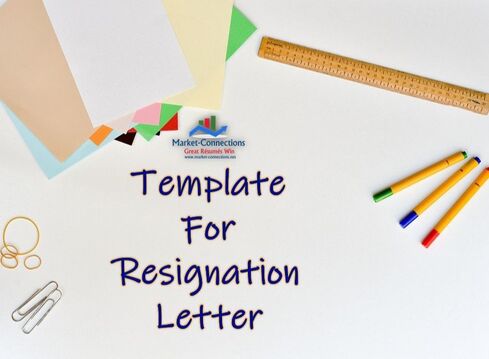





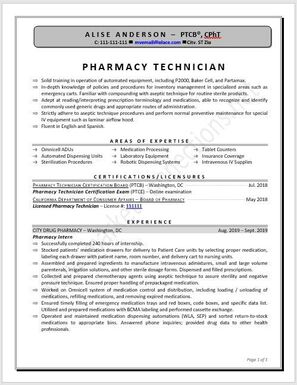
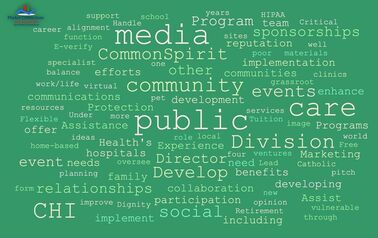



 RSS Feed
RSS Feed



